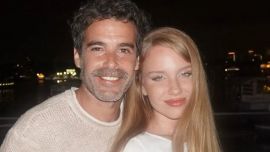On the grounds of what in 1958 became a wasteland in downtown Buenos Aires, Oscar-winning Argentine filmmaker Juan José Campanella has once again built a theatre, creating a new meeting place for porteños in the aftermath of the pandemic.
First planned to open in 2020, the Teatrro Politeama was caught up in Argentina's long Covid-19 confinement. Two years on, Campanella hopes it will introduce more vigour into the theatrical circuit that surrounds it on the capital's famous Avenida Corrientes.
"It seems to me that after the pandemic, and especially after the quarantine, people need to meet again, to go back to community activities where we are with others. I need it and I think a lot of people do too," he tells AFP as workmen put the finishing touches to the restored theatre.
Next to the seats, still wrapped in plastic, Campanella points out that, unlike cinema, theatre "is recovering all over the world."
"Perhaps [it's] because in the theatre you don't only meet the audience, but you also meet the actors. We are all part of this and it's like a celebration that feels much more joyful, much happier because the act we come to see is also with us in person," he explains.
Buenos Aires offers dozens of offerings each night, both in the big theatres of Avenida Corrientes and in smaller ones organised by the alternative theatre scene. Venues are running at full capacity and it is often difficult to get tickets for shows on the same day.
'Cinema and theatre, like gas'
Campanella, 62, won an Oscar in 2010 for El secreto de sus ojos ("The Secret in Their Eyes"), a film which also won him a Goya award. His filmography also includes features like El hijo de la novia, El cuento de las comadrejas and the animated picture Metegol. On television screens, he has directed the series Dr. House and Law and Order, among others.
Yet he considers theatre to be inseparable from his being.
"It is very difficult to say which is the place of theatre in my life and which is the place of cinema. Because it's like saying my mother's place and my son's place, or my wife's place and my brother's place. Each of them occupies 100 percent of the space. They are like gas, not like bodies, they mix and occupy all the space there is," he explains.
Campanella intends to make this union a reality in this new incarnation of the Teatro Politeama, which has a capacity of 705 spectators and will also be used for film screenings.
"We hope that this theatre, as well as being a place where you come to see a certain play, will become a place where you want to go," he says.
The Politeama theatre, whose original name has been retained, is one of the oldest in the capital. Created in 1879, it was demolished in 1958, but its destruction caused such a backlash that a law was then passed requiring that a theatre, and nothing else, be re-erected on the site where one once stood, Campanella explains.
"'Politeama' is a type of theatre in which there were many disciplines. They were theatres that could change configuration [for shows]. In this one, in the original, the seats were raised and it was a dance hall, you could do circus shows.... All of that was the 'poli,' because it had many forms," he says.
"We also want to do many disciplines. It won't be different in form, but there's going to be a screen, there's going to be cinema, the prefix 'poli' is still being validated," he argues.
In his own theatrical career, Campanella was critically praised for his adaptation and direction of Parque Lezama, a play by Herb Gardner that, in addition to being presented in Argentina, he took to Spain in 2019.
'Most terrible fear'
The excitement of the new theatre does not detract from what Campanella calls his "most terrible fear": that the cinema and theatres have been left behind by the pandemic.
"Sometimes, in my most terrible fears because I'm a cinema person, sometimes I say what if cinema was a 20th century thing, that technological advancements have made it so people prefer to watch at home?" he wonders.
"It's a fear I have. I hope people will come back, but already the production systems are feeding back so that doesn't happen," says the director.
Movies that aren't big action or superhero movies, supposedly big spectacle, have a very short window. They are already planned to be released on television simultaneously with the cinema. So they make it difficult for the audience," he laments.
related news
by Nina Negrón, AFP






















Comments